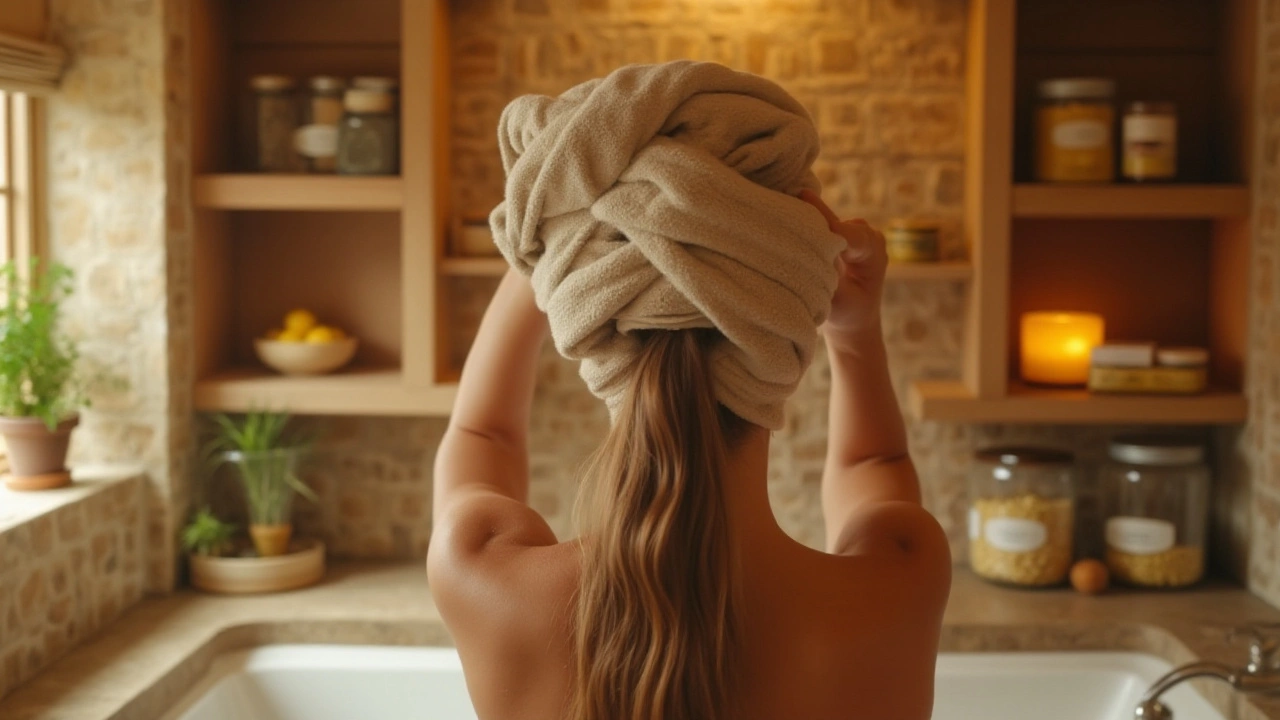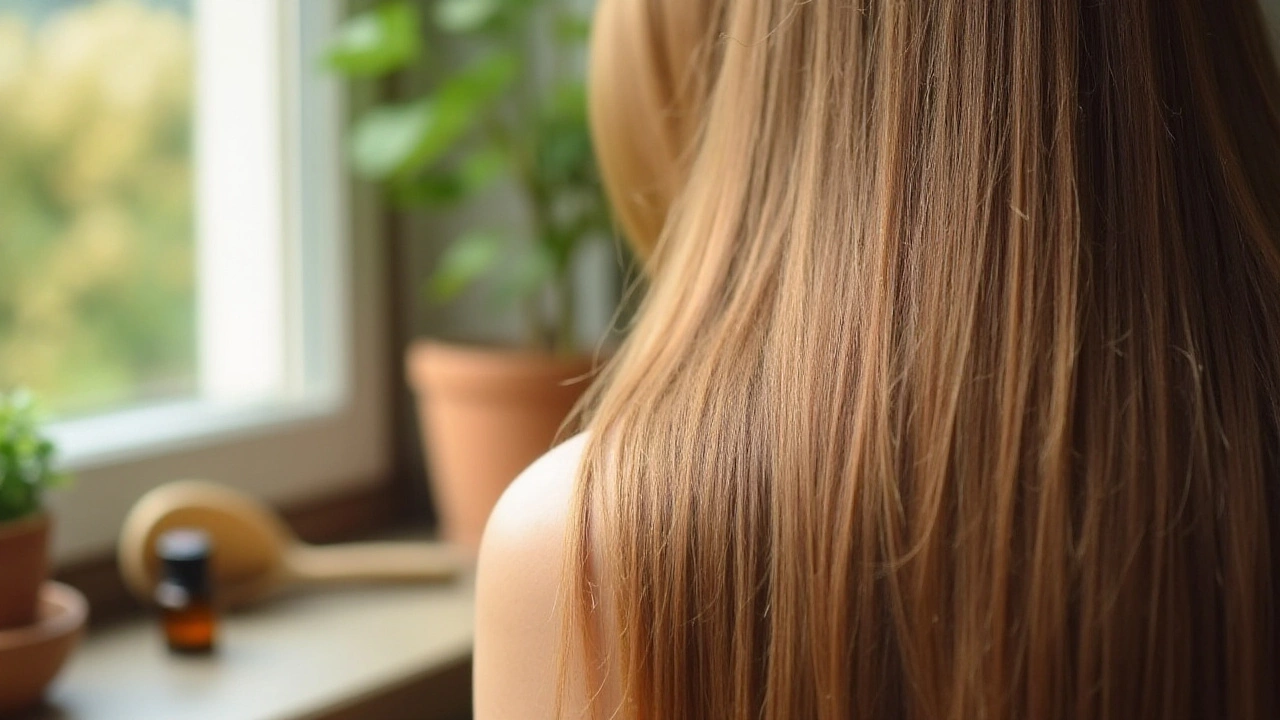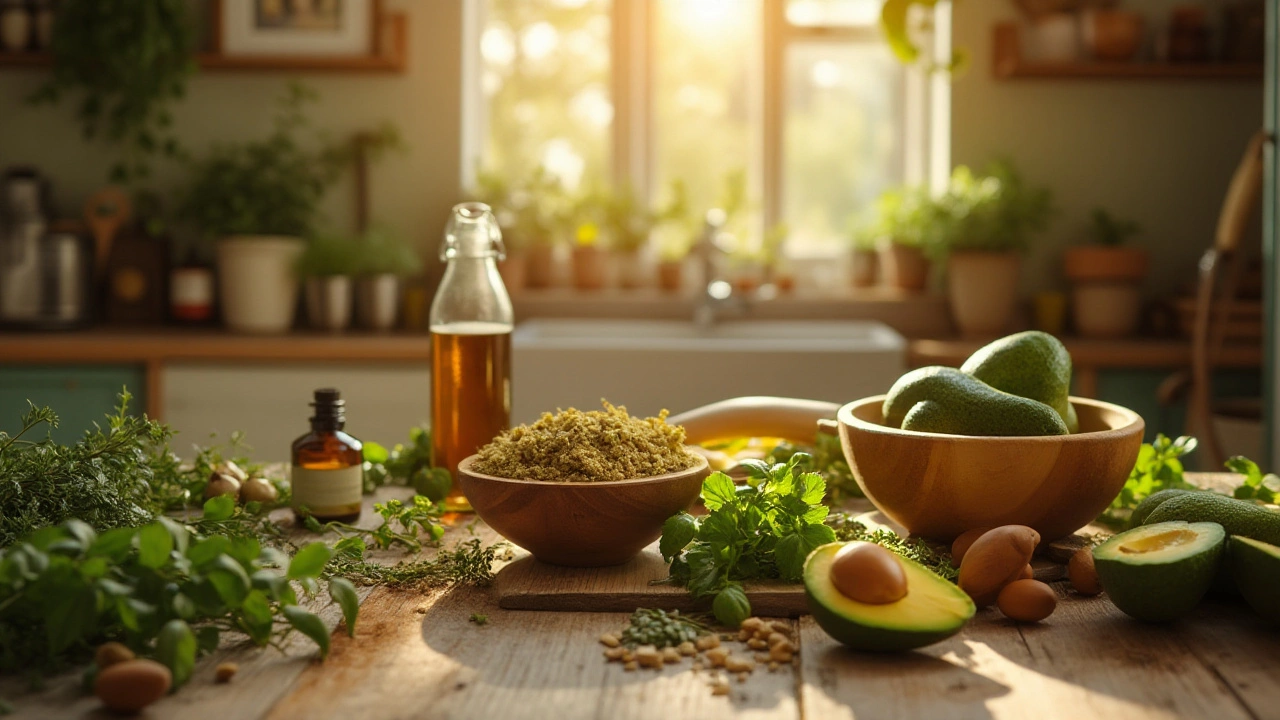Boost Your Hair's Health at Home: Easy Tips & Tricks
 Jan, 3 2025
Jan, 3 2025
Glamorous, healthy hair doesn't have to be a fantasy confined to shampoo commercials or the hands of professional stylists. In fact, with a little know-how, you can easily elevate the look and feel of your locks right at home. Whether you're battling dullness, frizz, or split ends, small changes can yield big results, turning your everyday routine into a rejuvenating ritual.
From understanding your hair type and needs to selecting products that deliver nourishment without harmful chemicals, the choices you make matter. You don't need a cupboard full of exotic potions; sometimes, the simplest solutions hold the most power. Ingredients commonly found in your kitchen can double as effective treatments to revitalize your hair naturally. Alongside styling secrets, a healthy lifestyle brimming with hydration and nutrition plays a pivotal role.
Embark on a journey where your hair becomes a testament to your devotion to self-care. So dive into these practical suggestions and discover a whole new relationship with your hair — one that’s easy to manage and even easier to love.
- Understanding Hair Health
- Choosing the Right Products
- DIY Hair Masks and Treatments
- Lifestyle Choices for Better Hair
- Tips for Maintaining Hair Quality
Understanding Hair Health
Learning about your hair's core structure and how it responds to different treatments is a great first step in improving its quality. Every strand of hair is made up of three main layers: the cuticle, the cortex, and sometimes the medulla. The outermost layer, the cuticle, acts like a protective shield keeping the more fragile layers beneath safe from harm. When your hair is healthy, the cuticle lies smoothly and reflects light, giving you that glossy sheen we all strive for. Heat styling, chemical products, and environmental factors can roughen the cuticle, leading to frizz and dullness.
Inside the cuticle lies the cortex, which determines the strength, color, and texture of each hair strand. This part of the hair is packed with proteins and pigments, crucial for maintaining that coveted resilience and bounce. When the cortex remains moisturized and intact, your hair is at its best, strong enough to withstand external stresses. Whereas, when the cortex becomes damaged, split ends and breakage can become a battle of daily duress.
To foster healthy hair conditions, attention to maintaining pH balance is essential. Hair tends to thrive at a pH between 4.5 and 5.5, slightly acidic, which helps keep the cuticle smooth and sealed. For instance, following up a shampoo with a conditioner that’s slightly acidic can help normalize your hair's pH, allowing it to lock in moisture and nutrients. As famously noted by the Trichological Society, "Hair care products with balanced pH levels can significantly affect hair quality over time."
Moreover, understanding your hair's specific texture and density can greatly tailor the care it needs. Curly hair, for instance, often requires more moisture than straight strands, as its shape naturally prevents natural oils from traveling down its length. Similarly, fine hair might benefit from volumizing treatments that add body without weighing it down. Embracing the uniqueness of your hair's natural characteristics can lead to more effective care strategies.
While biology plays a key role, external habits also make a big difference in your hair's vitality. Environmental stressors such as UV radiation can strip moisture and color, whereas pollution can lead to unwanted buildup. Protecting your hair from these elements, perhaps by wearing a hat or using protective sprays, can preserve its hair health. Meanwhile, maintaining a diet rich in vitamins and minerals nurtures your hair from the inside out, providing nutrients that contribute to robustness and shine.
Recognizing these factors gives you the groundwork from which to build a home hair care routine that's not just about immediate appearance but long-term health. By understanding and respecting your hair's needs, you open pathways to better beauty and confidence that shine from root to tip.
Choosing the Right Products
When it comes to enhancing your hair health, selecting the proper products is paramount. The right selection can safeguard your tresses from damage, provide moisture, and even assist in addressing specific concerns like dandruff or thinning. First, it's crucial to assess your hair type. Someone with thick, curly hair will need different product ingredients than an individual with fine, straight strands. For curly hair, products rich in moisturizing agents such as shea butter or coconut oil may envelop and soften curls, preventing frizz while giving definition and bounce. Meanwhile, fine hair might benefit from volumizing agents and lighter formulations that don't weigh it down.
Perhaps the most significant shift in home hair care has been the preference for sulfate-free shampoos. Sulfates are harsh cleansers that strip the scalp of essential oils, which can lead to dryness and irritation. Opting for a sulfate-free option preserves the natural moisture balance, making hair products like these especially beneficial for those with color-treated hair or scalps prone to dryness. In fact, a recent consumer report noted that 72% of buyers noticed a substantial improvement in their hair's condition after switching to sulfate-free products, enjoying enhanced vibrancy and softness.
"It's amazing how choosing the right shampoo can act as a game-changer for your hair," says renowned dermatologist Dr. Linda Mays. "I've seen firsthand how individuals who adapt their routines notice improvements, not just in texture and appearance, but their hair health overall benefits."Among other considerations, one should be wary of products containing excessive alcohol, parabens, and synthetic fragrances. Though they might temporarily provide shine or fragrance, they can be damaging in the long run by drying out the scalp or causing buildup. An excellent alternative might be looking into natural and organic labels that boast ingredients like aloe vera for hydration and green tea extracts for their antioxidant properties.
Shopping smart for natural hair products includes understanding labels and ingredient lists. A rule of thumb is the closer an ingredient is to the top of the list, the more abundant it is within the product. Keep an eye out for buzzwords that might mislead rather than inform. Pure Argan Oil, for instance, must be the primary ingredient for its full benefits, not just a minor addition. This attention to detail not only informs better buying decisions but also fosters an understanding of what your hair truly needs.
For those invested in hair care transformations, DIY experimentation can yield fantastic results. Nothing beats pairing custom products with lifestyle shifts. Whether it's a revitalizing rinse or a deep conditioning treatment you concoct at home, these selections shape how your journey to better hair health unfolds, all while empowering your choices. Individuals merely need to take a little time understanding their hair's signals, and they'll find the path to luscious, resilient hair is more attainable than they may have imagined.

DIY Hair Masks and Treatments
Creating your own hair masks and treatments at home can be a delightful and rewarding experience, offering a chance to harness nature’s gifts while catering to your specific hair needs. Unlike many commercial products, homemade concoctions allow you to control what you put on your scalp, ensuring that you only use natural, nourishing ingredients. An avocado and olive oil mask, for instance, is celebrated for its ability to deeply moisturize and repair dry hair, thanks to their rich content of essential fatty acids and vitamins. Simply mash a ripe avocado, mix it with a tablespoon of olive oil, and apply it from root to tip. Leave it on for about 30 minutes before rinsing thoroughly. This simple yet effective treatment is loved by many, including beauty gurus who claim it makes their hair feel instantly softer and more manageable.
For those seeking to add volume and shine, egg and yogurt masks are a classic choice. Eggs are packed with protein, which can strengthen and thicken hair strands, while yogurt contains lactic acid which gently cleanses the scalp, promoting a healthy environment for growth. To whip up this hair-boosting blend, whisk two eggs with half a cup of plain yogurt, and smooth it through your hair. Cover your hair with a shower cap to prevent drips and maximize absorption. Let it sit for 20 minutes before washing with cool water. Regular use of this mask can lead to visibly fuller and shinier hair, as has been vouched by numerous natural hair care advocates.
"Natural ingredients like avocado and egg have been used for generations to maintain hair health. They offer nourishment without the harsh chemicals found in many retail products," says Dr. Elizabeth Jones, a well-known trichologist.
The wonderful thing about homemade treatments is their adaptability. Those with oily hair might opt for a lemon and Aloe Vera gel combination. Lemons not only add a refreshing scent but their natural acidity helps balance the scalp's oil production, while Aloe Vera soothes any itching or irritation. Mix the juice of one lemon with Aloe Vera gel and apply it primarily to the scalp; this blend can help reduce dandruff and excess oil, making your hair feel light and fresh. Leave it for about 15 minutes and rinse it out with lukewarm water.
Advocating for sustainability and simplicity, DIY hair treatments are not just beneficial for your hair but kind to the environment too. Ingredients like coconut oil, known for its deep conditioning properties, and honey, recognized for its humectant qualities that lock moisture in the hair, often serve as staples. Warm a tablespoon of coconut oil mixed with a teaspoon of honey and massage it into your hair. This soothing combination helps repair damaged cuticles and prevents split ends. A 2018 survey showed that nearly 65% of participants reported noticeable improvements in their hair texture after using coconut oil treatments consistently.
Lastly, to amplify your hair improvement journey, regular application of these natural hair products can rejuvenate and maintain healthy locks. Consistently using DIY masks rich in essential nutrients not only enhances hair quality but supports a holistic approach to hair care where you are in control, embracing both tradition and innovation. With a little commitment and creativity, the results can be both visible and satisfying, turning ordinary days into indulging spa-like experiences at home.
Lifestyle Choices for Better Hair
When it comes to achieving enviable, healthy hair from the comfort of your home, lifestyle choices can significantly impact your results. Of course, products matter, but the way you live day-to-day sets the foundation for your hair health. Start by ensuring your diet is enriched with essential nutrients. Protein, for instance, is a crucial building block of hair, which makes foods like lean meats, eggs, and dairy indispensable. Biotin and zinc are also heroes in promoting growth and strength, so include nuts, seeds, and leafy greens in your meal plan. Ample iron and vitamin E help maintain luscious locks by improving circulation and keeping follicles fit.
Hydration is another cornerstone of good hair care. Your strands thrive on moisture not just from conditioning treatments but from the inside out, so make sure you're drinking about 8 glasses of water daily. Proper hydration helps maintain the elasticity and durability of your hair, reducing breakages and split ends. Hair that's parched is more prone to frizz, a common issue many of us face. By simply keeping hydrated, you can tackle frizz head-on and add a touch of shine.
Sleep and stress management also play an unmistakable role in hair quality. Think about it—when you’re sleep-deprived or stressed, it’s visible all over, including on your head. Ensuring a good night’s rest—not less than seven hours—alongside practicing mindfulness techniques like yoga or meditation, can balance cortisol levels that otherwise negatively affect hair growth. Try to incorporate moments of relaxation into your daily routine.
"Hair is a reflection of what’s going on inside your body," shares Dr. Howard Sobel, a dermatologist in New York City. "Stress management and a good diet are more impactful on your hair than any product could ever be."
Physical activity is just as important. Regular exercise stimulates blood flow, which means more oxygen and nutrients are delivered to your scalp, boosting hair growth. Even low-impact activities like walking or using the stairs can make noticeable differences over time. Optimize each routine by incorporating a relaxing scalp massage at the end of the day to improve circulation further.
In essence, achieving and maintaining healthy hair is a holistic journey that extends beyond the shower. It's in the mindful bites you take at meals, the mindfulness breaks you integrate into workdays, and even in the laughter you share with friends and family. Consciously choosing these habits will naturally reflect in your hair's improved texture, strength, and shine—turning every day into a good hair day.

Tips for Maintaining Hair Quality
Maintaining brilliant and healthy hair is not just about the products you use or the treatments you undertake; it involves a comprehensive approach that encompasses everyday habits and the awareness of what you expose your strands to. Foremost, keeping your hair clean is crucial, but washing it too frequently can strip it of natural oils that are essential for its health. Aim to wash your hair two to three times a week, and use shampoo and conditioner that are suited to your hair type. These products should be sulfate-free to avoid harsh cleansing that can lead to damage, and incorporating a weekly deep conditioning treatment can provide the moisture your hair craves.
Another important aspect is safeguarding your hair from heat damage. As much as straighteners and curling irons can give your hair that glam look, they can also be quite detrimental if not used wisely. Always use heat protectant sprays before styling with any hot tools and try to embrace natural styles more often to reduce the frequent exposure to heat. It is equally critical to allow your hair to air dry partially before using any blow-dryer on a cool setting to minimize the drying effects.
Nutrition plays a foundational role in hair quality. Consuming a diet rich in vitamins and minerals can significantly improve strength and shine. Essential nutrients like biotin, vitamin E, and omega-3 fatty acids found in foods such as nuts, seeds, fish, and leafy greens can promote better hair growth and resilience. Hydration is another key element; ensuring you are drinking enough water daily helps keep your hair hydrated from the inside out. Consider adding hair-friendly supplements if your diet might be lacking in certain nutrients.
Regular trims are often overlooked in the quest for maintaining healthy hair, but they help in eliminating split ends and keeping your hair looking fresh. Even if you're growing your hair out, a trim every six to eight weeks can prevent damage from moving up the hair shaft. Consider visiting the salon for a dusting, which is a technique that removes the very tips of the strands without compromising length, to keep your mane in top shape.
Environmental factors like sun exposure and pollution can also take a toll on your hair’s quality. Protecting your hair from these factors by wearing hats or using hair care products with UV protection can make a notable difference. Incorporating a detoxifying hair treatment once a month can help cleanse the scalp and strands from pollutants, ensuring your hair health remains uncompromised.
Many hair experts suggest incorporating a silk pillowcase into your routine as a frictionless surface reduces hair breakage during sleep. This simple switch can lead to smoother textures and less frizz over time. Furthermore, being gentle with wet hair is paramount, as it is at its weakest state. Avoid vigorous towel drying and opt for a soft microfiber towel or an old t-shirt to gently blot excess water away.
"The secret to maintaining lustrous hair doesn't only rest on products, but on a holistic lifestyle approach," says renowned trichologist Dr. Helen Michaels.
Personalizing your hair care based on your specific needs and being mindful of the combination of factors contributing to hair quality will help you achieve the head of hair you’ve always desired. Every strand matters, and treating your hair with the care it deserves will profoundly reflect on its quality and appearance.
